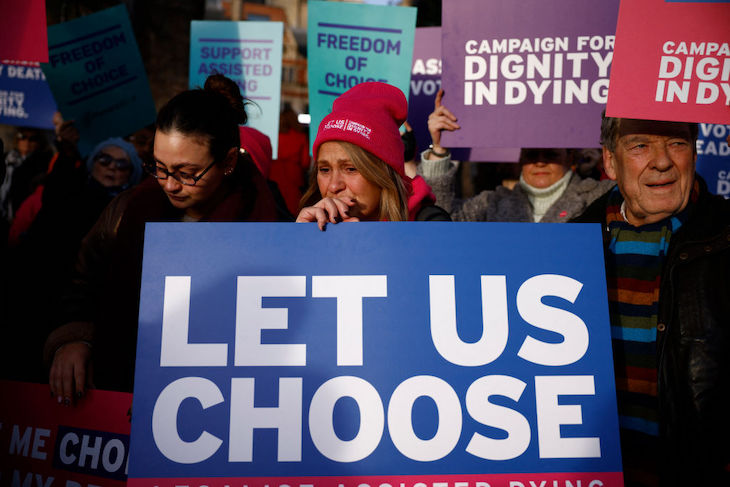Who would envy being an MP today when called upon to vote on a matter of conscience: the assisted dying bill? The issue cuts across party lines, and so whichever way they vote they will offend a good proportion of their own voters. But on the other hand, for once they are being trusted to use their own judgement rather than hiding behind party whips. That, surely, must be liberating.
Might the comfort of knowing that assisted suicide were available at a later date dissuade able people from taking their lives?
And which of us can say we haven’t found ourselves feeling that we must come down on one side or the other? I have a feeling that, were I in the House of Commons, I would still be wavering as I approached the lobbies. There is something deeply disturbing about assisted suicide. The British state stopped executing people 60 years ago; it feels odd that it might again seize the power to take life, even in circumstances where that is what people want.
You only have to look at what has happened in Canada, Belgium and the Netherlands to see the truth behind the ‘slippery slope’ argument. What started in Canada as something which could only be undertaken where death was reasonably foreseeable rapidly evolved beyond that. Assisted dying in those countries has been extended.
I would worry, too, what victory in the assisted dying vote would mean for abortion. The pro-abortion lobby would take it as a sign that Britain was inexorably moving away from fuddy-duddy pro-life arguments and towards the full decriminalisation of abortion – which involves terminating the lives of humans who very much don’t get a say in the matter.
So for all those reasons I am a ‘no’. Yet still there is a niggling argument in the back on my mind: what if assisted dying actually turned out to save lives? It is an argument we haven’t heard much over the past few weeks, although it has popped up on previous occasions when the matter has been debated. Whether or not society sanctions assisted suicide, unassisted suicide will always be with us. However good is palliative care, or however effective the tremendous work of the Samaritans, there will always be people who will choose to take their own lives in order to save themselves from suffering a drawn-out terminal illness. For many, it is not just a question of pain and loss of faculties but the loss of independence. But anyone who is minded to take the quick route out faces a choice: do they do the deed now, while they can, or do they risk waiting until it is too late, when they have lost the ability to do so? Were they to know that assisted suicide would be available at a later point in their illness, it might well make people less inclined to take their lives.
I am reminded of the case of Chris Woodhead, the former Ofsted chief who in 2009 announced that he had been diagnosed with motor neurone disease. Initially, he suggested that he was not minded to live out the progress of his disease. He became a campaigner for assisted dying, saying: “I am clear in my own mind that it is better to end it than continue a life that is extremely frustrating for me and onerous to others who are living with me.”
He added: “The truth is I would be more likely to drive myself in a wheelchair off a cliff in Cornwall than go to Dignitas and speak to a bearded social worker”.
Yet Woodhead never did drive his wheelchair off a cliff. He died in 2015 aged 68, at home. Having clearly contemplated suicide while he could, he ended up seeing out his disease. I never knew him and don’t know what quality of life he had in his final years. But if the comfort of knowing that assisted suicide were available at a later date dissuades able people from taking their lives that seems to me a rather good thing. I am not sure that it would be enough to make me march through the ‘ayes’ lobby, but it is an argument which deserves to be considered.
Watch more on SpectatorTV:








Comments